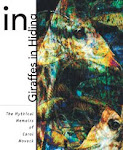What is ‘Experimental Fiction’ Anyway, and Who Reads It?
by Marc Lowe
(Asterix (*) indicate Author's notes, which follow the essay, by their number. )
As a writer of primarily non-mainstream fiction and prose-poetry, I sometimes find myself in the awkward position of having to try to explain to someone what kind of writing it is that I “do.” For lack of a better explanation, I will usually say something like, “Well, most of what I write tends to be experimental in nature.” When the inevitable follow-up question, “What do you mean by ‘experimental’?” arises, I often falter, for “experimental” is, if anything, an inclusive term that denotes a wide range of styles and genres. For example, the modernist prose of Joyce’s Ulysses or Finnegan’s Wake, the fragmented drug-induced postmodern ramblings of Burroughs’s Naked Lunch, the cleverly intertwined metafictional narratives of Italo Calvino’s wonderfully playful novel If On a Winter’s Night a Traveler…, and the thematically-linked, though incongruous, fragments of contemporary author Ben Marcus’s The Age of Wire and String can all be considered, in some sense, “experimental” works, despite the fact that they are quite different from one another in both form and content, and that the authors who wrote said works all live/d in very different times and had (or have) very different backgrounds.

 The question I would like to pose at the outset of this short essay is as follows: Who reads (or writes) so-called experimental fiction, and why? There is perhaps no better place to start than with “New Novelist” (nouveau roman) Alain Robbe-Grille’s groundbreaking work For a New Novel. The following excerpt, from an essay he wrote in 1957, sums up the prevailing attitudes of his time toward what a “story” (i.e. novel) must “consist of” in order to be taken seriously by the public/press:
The question I would like to pose at the outset of this short essay is as follows: Who reads (or writes) so-called experimental fiction, and why? There is perhaps no better place to start than with “New Novelist” (nouveau roman) Alain Robbe-Grille’s groundbreaking work For a New Novel. The following excerpt, from an essay he wrote in 1957, sums up the prevailing attitudes of his time toward what a “story” (i.e. novel) must “consist of” in order to be taken seriously by the public/press:
Proceed to Mindfire Renewed (link above) to read the rest of the essay.












No comments:
Post a Comment